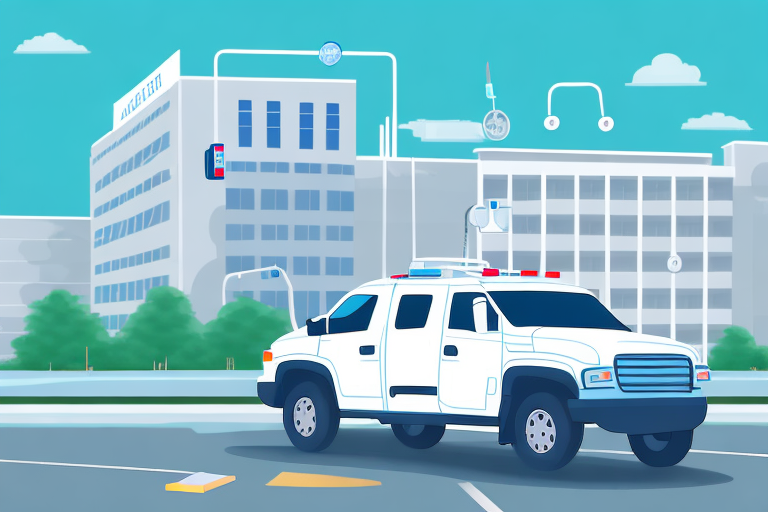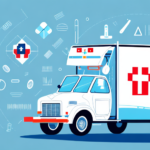Why Medical Carrier Jobs Are in High Demand
The demand for medical carrier jobs has surged in recent years, driven by several key factors. The healthcare industry is expanding rapidly, with the U.S. Bureau of Labor Statistics projecting a 12% growth in medical transportation roles from 2021 to 2031, significantly faster than the average for all occupations.
The aging population in the United States is a major contributor to this trend. As more individuals require medical care, the need for timely delivery of medical supplies, equipment, and medications increases. Additionally, the COVID-19 pandemic underscored the critical role of medical carriers in ensuring the consistent supply of essential goods to healthcare facilities. According to a CDC report, the pandemic accelerated the integration of medical logistics into the broader healthcare response, highlighting the indispensability of reliable medical carriers.
Qualifications and Skills Required for Medical Carrier Jobs
Educational and Licensing Requirements
Prospective medical carriers typically need a high school diploma or equivalent. A valid driver's license is mandatory, and some positions may require specific vehicle permits. Employers often prefer candidates who have completed training programs focusing on safe driving practices, delivery procedures, and customer service skills.
Essential Skills for Success
Beyond formal education, successful medical carriers possess strong communication, time management, and adaptability skills. They must navigate routes efficiently, manage their schedules meticulously, and maintain a high level of attention to detail to ensure accurate deliveries. Additionally, the ability to remain calm under pressure and interact professionally with healthcare providers and patients is crucial.
Safety Considerations
Safety is paramount in this role. Medical carriers should adhere to all traffic laws, avoid distractions while driving, and perform regular vehicle inspections. Proper handling and disposal of medical supplies, including hazardous materials, are also essential to ensure the safety of themselves and others.
How to Find and Apply for Medical Carrier Jobs
Online Job Portals
Platforms such as Indeed, LinkedIn, and Glassdoor are excellent resources for finding medical carrier positions. These sites allow job seekers to filter opportunities based on location, experience level, and other preferences.
Staffing Agencies
Specialized staffing agencies can streamline the job search process by matching candidates with positions that align with their skills and career goals. Agencies often provide additional support such as interview coaching and resume optimization to enhance candidates' prospects.
Networking and Direct Applications
Connecting directly with healthcare facilities, hospitals, clinics, and pharmacies can also uncover job opportunities. Attending industry events and joining professional networks can expand one’s professional connections, increasing the likelihood of finding suitable positions.
Roles, Responsibilities, and Daily Tasks of a Medical Carrier
Primary Responsibilities
The core responsibility of a medical carrier is to ensure the timely and safe delivery of medical supplies, equipment, and medications. This includes loading and securing items such as oxygen tanks, patient beds, wheelchairs, medical instruments, specimens, and pharmaceutical products. Adhering to strict delivery schedules is essential to support the operational needs of healthcare providers.
Time Management
Effective time management is critical. Carriers must plan their routes efficiently, account for loading and unloading times, and adjust schedules as necessary to accommodate unforeseen delays. Utilizing GPS technology and real-time tracking systems can enhance route planning and delivery accuracy.
Technology Integration
Modern medical carriers leverage technology to improve efficiency. Tools such as barcoding and scanning systems help in inventory management, while electronic signature devices facilitate proof of delivery. Mobile applications like Uber Health enable carriers to manage deliveries seamlessly and provide real-time updates to recipients.
Career Advancement and Opportunities
Advancement Paths
Medical carriers have various pathways for career advancement. Opportunities include moving into supervisory roles, specializing in specific types of medical deliveries, or transitioning into logistics and supply chain management within the healthcare sector.
Independent Contractor vs. Employee
Choosing between working as an independent contractor or an employee affects career trajectory. Independent contractors may enjoy greater flexibility and higher earning potential but must manage their own expenses and lack employer-provided benefits. Employees typically receive benefits and job stability but may have less flexibility in their schedules.
Working for Large vs. Small Companies
Large medical carrier companies often offer comprehensive training programs, better benefits, and more advancement opportunities due to their extensive networks and resources. In contrast, smaller companies may provide a more personalized work environment and greater flexibility, which can be appealing to those seeking a closer-knit workplace.
Benefits and Perks of Working as a Medical Carrier
Top medical carrier companies, such as FedEx, UPS, and Amazon, offer a range of benefits to their employees. Common perks include:
- Health Coverage: Comprehensive medical, dental, and vision insurance.
- Paid Time Off: Vacation days, sick leave, and holidays.
- Retirement Plans: 401(k) or other retirement saving options.
- Performance Incentives: Bonuses and incentive programs based on performance.
- Career Development: Opportunities for training and professional growth.
- Employee Discounts: Discounts on company services and products.
The Future Outlook for Medical Carrier Jobs
The future of medical carrier jobs appears robust, with continued growth anticipated as the healthcare sector expands. Innovations in technology, such as autonomous delivery vehicles and advanced logistics software, are expected to further streamline operations and enhance efficiency. According to the U.S. Bureau of Labor Statistics, the integration of artificial intelligence and machine learning in logistics will likely create new opportunities and demand for skilled carriers who can adapt to evolving technologies.
Moreover, the increasing emphasis on home healthcare services is expected to drive demand for medical carriers who can deliver supplies directly to patients’ homes, making this career path both dynamic and essential in the modern healthcare landscape.
Conclusion
Medical carrier jobs play a pivotal role in the healthcare industry, ensuring the timely delivery of essential supplies and medications to healthcare facilities and patients. The demand for these positions is fueled by the growing healthcare sector, an aging population, and the lasting impacts of the COVID-19 pandemic. To excel in this field, individuals must possess a combination of relevant qualifications, strong interpersonal skills, and the ability to manage time effectively. Embracing technological advancements and seeking continuous professional development can further enhance career prospects. With competitive compensation, numerous advancement opportunities, and the satisfaction of contributing to vital healthcare services, a career as a medical carrier can be both rewarding and impactful.



















